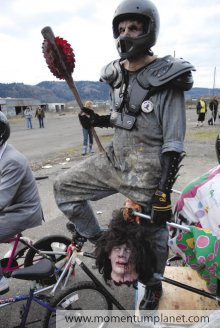Film review: Veer - the movie
Directed by Greg Fredette
98 minutes, hdv, colour
Want to borrow this movie from CAN?
When Greg Fredette started making Veer, a new feature-length documentary about bike culture in Portland, Oregon, he had less faith in his community. But as he followed the tributaries of the cycling scene, he found an increasing sense of hope.
“I feel like I’m far less cynical than I used to be,” he says, speaking from Portland a week before Veer premiered in February. “I noticed a change in myself. I had found myself disappointed in our government and our community – but I met so many people who are dedicated to improving things.”
One such character in Veer is Steven Kung, president of Exchange Cycle Tours, a program that uses bicycles for social/travel exchanges.
“An average guy,” Fredette says, “who decided to save the world in his own way. Seeing everything he has to go through, has to put up with – I’m more optimistic now – it’s been an amazing experience.”
Veer is an intense, funny, and wide-ranging movie, and the stories it tells could really be told anywhere. What holds them together is the thin but strong thread of two-wheeled transport.
“I’m not including everyone on a bike as bike culture – it’s when people come together around bikes,” Fredette says. “There’s a social aspect to cycling. It can be as extreme as bicycle art, or as simple as a Sunday ride. Bike culture is not a subculture – it’s a bigger thing.”
Veer introduces us to the renegade Zoobombers: grown-ups with a punk ethos who ride high-speed down the hills from the Portland Zoo, often incurring the wrath of local police. We also follow the suit-wearing Scott Bricker, executive director of Portland’s Bicycle Transportation Alliance. He lobbies state senators to pass laws that would punish reckless drivers who injure cyclists or other “vulnerable road users.” There is also a mix of activists, educators, riff-raff and dancers – sometimes a combo of all the above – and then there are the tragic stories of cyclists killed in action.
Fredette, along with co-producer Jason Turner, had to narrow down the most compelling stories that played out during the 300 hours or so of footage they shot for the film.
“It was absolutely brutal,” Fredette says. “We were at a lot of different places at a lot of different times. We were sleep-deprived.”
“When I started writing, it all clicked.” Fredette says. “People say, ‘I’m not really a bike advocate.’ But what’s so impressive about bike culture is that the only thing we’re asked for is participation: Just show up.”
At the anarchic and festive end of the spectrum, daring bike punks play rambunctious, gladiatorial bike-chariot games at Mini Bike Winter and joust on tall bikes and unicycles during Pedalpalooza. At more civilized gatherings, the Community Cycling Centre teaches young kids the safest way to ride: single file in traffic, no passing, always wear your helmet.
This is the greatest value of Veer. It unfolds a big road map of the bike world: a distributed community in which sometimes interweaving, sometimes distinct, and often hazily-defined groups choose wildly different strategies which lead in equally different directions. The average cyclist you see on the street might have no clue about these cultural nooks and crannies in their city, but all of us on bikes are affected by them.

